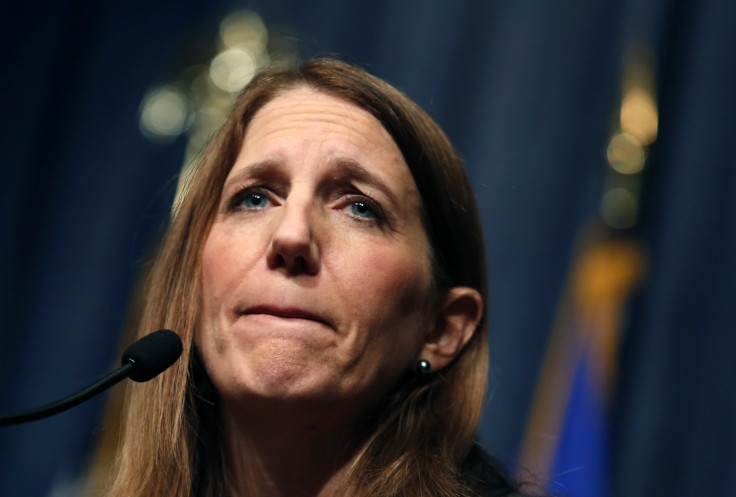King v. Burwell Oral Hearings On Affordable Care Act: Key Facts, Arguments, Explanations On Challenge To Obamacare

At 10 a.m. Wednesday, the Supreme Court will hear arguments in the case King v. Burwell, the second Supreme Court case in three years regarding the Affordable Care Act. The implications of this case are enormous; if the court rules against the government, it will devastate Americans’ ability to buy health care coverage, experts say. Here’s what you need to know about the case and Wednesday’s hearing.
Wednesday’s hearing is scheduled to last one hour, since in Supreme Court oral hearings, each side is typically given 30 minutes to argue their case. Given that no other cases are scheduled for the day, the arguments for King v. Burwell could run longer. The Supreme Court is expected to issue a ruling by the end of June. King refers to the Virginia man in whose name the lawsuit was filed, while Burwell refers to Sylvia Mathews Burwell, U.S. Secretary of Health and Human Services.
The case hinges upon four words: “established by the state.” Part of the Affordable Care Act says that subsidies to offset the cost of health care are available to Americans who have purchased health care in an exchange “established by the state.” Based on that phrase, the plaintiffs argue that subsidies in the form of tax credits are legally granted only to those who purchase insurance solely from state-run exchanges, and not to those living in the 37 states that did not set up their own exchanges and opted instead to run them through the federal government’s HealthCare.gov.
According to a post on the Supreme Court’s blog, the hearing will focus on what Congress really intended when it created the subsidy system in the nearly 1,000-page law in 2010. The challengers in this case have argued that the words “established by the state” should be applied literally, and that the reason Congress wanted to grant subsidies to states that established exchanges was as an incentive to get them to do so. The government has argued that the language should be taken in the context of the rest of the law and the system it has created, and that subsidies are critical to the functioning and the success of the Affordable Care Act in making health care coverage affordable and accessible to all Americans.
Some estimates say 6 million Americans could lose subsidies, and if they do, health insurance would become unaffordable. Of the 11.2 million who bought health insurance through state and federal exchanges during the open enrollment period that ended in February, 87 percent qualified for subsidies. If people cannot afford insurance, healthy ones will drop coverage, many have predicted, leaving more sick people on the exchange. That would cause overall prices of monthly premiums to shoot up, Jonathan Cohn of the New Republic has argued. As a result, even those who do not receive subsidies would be affected if they live in states that use the federal exchange.
This latest high-profile challenge to the Affordable Care Act comes from a 64-year-old veteran named David King, who did not want to buy health insurance. King qualified for subsidies that would make health care affordable for him, and so he is required to purchase it under the Affordable Care Act’s individual mandate. If King hadn’t qualified for subsidies, he would have been exempt from the requirement that he purchase health care, based on the fact that health care would have otherwise been unaffordable for him.
King and three fellow Virginia residents, Brenda Levy, Rose Luck and Douglas Hurst, filed a lawsuit challenging the Internal Revenue Service’s rule that allows subsidies to be given to Americans buying insurance on the federal exchange. The case was rejected by lower courts, but in November 2014 the Supreme Court agreed to hear it. The Competitive Enterprise Institute, a libertarian think tank, organized and is paying for the legal team, and Mother Jones has reported that the argument behind the King case really began in 2010 as a legal theory at a conference sponsored by the American Enterprise Institute.
More than 50 amicus briefs, which are filed by people or groups who take a strong interest in a case but are not directly involved, have been filed in advance of Wednesday's arguments. More than 20 briefs have been filed on behalf of the challengers, mostly from conservative and libertarian groups, plus six states and 15 members of Congress. More than 30 briefs from liberal and civil rights advocacy organizations, health industry groups and others have been filed on the government’s behalf, according to a post on the Supreme Court's blog.
If the law is overturned, the government has said it has no plan B. “A decision against the Administration in the King case would cause massive damage,” Burwell wrote in a letter to members of Congress on Feb. 24, 2015. “We know of no administrative actions that could, and therefore we have no plans that would, undo the massive damage to our health care system that would be caused by an adverse reaction,” the letter said.
© Copyright IBTimes 2024. All rights reserved.












